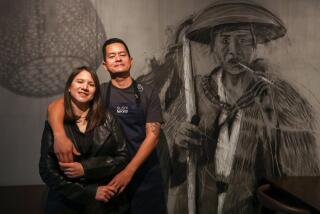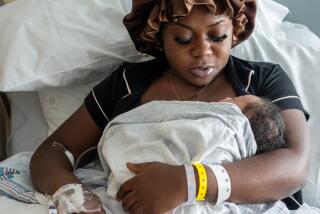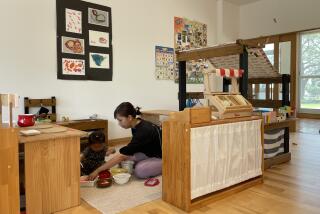Countywide : Japanese Study UCI Hospital Procedures
- Share via
Only four hours after two tiny, twin sisters prematurely entered the world Wednesday, they were awash in a sea of oohs and aahs from a handful of young Japanese nurses who spent the day touring UC Irvine Medical Center.
Fifteen Japanese midwives are spending the week learning the medical and cultural differences between the two countries. One of their first revelations about American health care? Nurses wear pants. In Japan, they say, only dresses are allowed.
“They’re really interested in how we interact with the doctors because of the hierarchy in Japan,” said Susana Perez, a UCI Medical Center nurse who is chaperoning the visitors. “Here, we use a real team approach. It really shocks them.”
After viewing normal and Cesarean births at the medical center, the nurses visited newborns Emily Jo and Loren Cladinos in the neonatal intensive care unit. The twins each weigh less than 5 pounds and were born six weeks premature, but UCI nurses say they are doing fine.
Riyu Aoshima, a 24-year-old nurse at Tokyo Medical College Hospital, lightly touched a stethoscope to the delicate chest of Emily Jo, the smaller of the twins, who weighs only 3 pounds, 4 ounces. Aoshima’s limited command of English seemed suddenly irrelevant as she caressed the baby girl’s head, listening to the rhythms of the small, yet ferociously beating heart.
Aoshima is working on her English for professional reasons, she said, because of the increasingly diverse nature of Japanese hospital patients.
“We have to speak some English, Spanish and Chinese.”
In Japan, it is not uncommon for the college-educated midwives to assist in the household chores of their patients during home care.
“They cook, they clean, they do laundry and they deliver babies,” said UCI labor and delivery nurse Judy Belman. “They do everything.”
Unless there are complications, a Japanese midwife will deliver the baby under the supervision of a physician. New mothers typically spend five to six days in Japanese hospitals after giving birth, and as long as two weeks when delivery is by Cesarean section. At UCI Medical Center, new mothers spend a single night in the hospital after a normal birth and four days at most after a Cesarean section.
This is the second year that UCI obstetrics professor Dr. Yuji Murata has invited Japanese nurses to observe medical procedures at UCI Medical Center. The nurses are selected from cities throughout Japan by the Medicus Publishing Co. of Osaka. Nancy Binder, clinical nurse supervisor for labor and delivery at UCI Medical Center, says the cultural exchange goes both ways.
“We’re happy to share what we’re doing, but we don’t have the cornerstone on what is always the best way to do things,” Binder said. “We ask them questions too.”
Of nearly equal importance to the Japanese nurses is the variety of Southern California cuisine, according to Perez, who took the nurses to a Mexican restaurant on their first day in Orange County. Next on their list was lobster, Italian food and a salad bar.
“They also want to go to a brewery,” Perez said. “They’re really serious about this. They want to taste our beer.”






